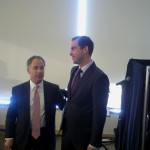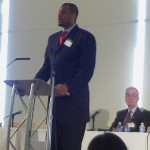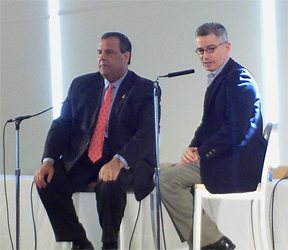By Ricardo Kaulessar    Photos by Ricardo Kaulessar
The odds of Governor Chris Christie, Jersey City Mayor
Steven Fulop, New Jersey U.S.

Attorney Paul Fishman and former NBA player Jayson Williams all being at the same place seems highly unlikely. Unless the issue is prisoner reentry.
The topic of ex-offenders coming back into society was what brought the four men into the same space as they were all keynote speakers at the Prisoner Reentry: Breaking the Cycle conference held on April 17 at Saint Peters University in Jersey City.
The event, sponsored by various entities including the Jersey City

Employment and Training Office, Integrity House and Saint Peters University, is an extension of the policy goal of the new Employment and Training Office Director, former Governor Jim McGreevey, to help those coming out of jail to integrate back into society.
Williams, the onetime New Jersey Nets star, shared his powerful personal story of rebuilding his life after serving time in prison for several brushes with the law including the accidental shooting death of his limousine driver, Costas “Gus” Christofi, in 2002.
He broke into tears on several occasions when he spoke about such matters as how his reckless behavior took an emotional toll upon his family, the difficulty of finding a place to live (especially in Jersey City) after leaving jail in 2012 and finding a new purpose in his life by helping others who were formerly incarcerated.
“I want you all to know that I’m here for one reason today, and that’s because I believe that I can help my colleagues,†Williams said.
Williams also thanked Fulop for meeting with him during the conference and even having his picture taken with Williams when considering Fulop’s political ambitions, a reference to Fulop being considered a contender to become the state’s next governor in 2017.
Fulop had opened the conference earlier in the day by addressing how Jersey City dealing seriously with the matter of prisoner reentry with a three-pronged strategy of providing employment, housing and addiction treatment. Fulop would later, during a break from the conference, address the media about crossing paths briefly with Christie – before the governor spoke at the event – for the first time since last July as Fulop has since had a political falling out with the governor for not endorsing him for reelection.
Adding to the drama was the guest speaker who followed Fulop and preceded Christie.
Paul Fishman and his office of prosecutors are currently investigating the closing of lanes leading to the George Washington Bridge that occurred last fall, which involved Christie administration allies and aides.
However, Fishman did not bring up that subject as he was focused on what the New Jersey U.S. Attorney’s Office has done on the prisoner reentry front. In particular, he described how his office put together its “ReNew Program†that has provided services to onetime inmates from proofreading resumes to helping them find apartments.
“We will never arrest our way out of the problems of crime. Only by emphasizing prevention and reentry, together with enforcement, do we have a chance to make a real and lasting impact on the violence and other issues that plague our communities,†Fishman said.
After his speech, Fishman greeted Fulop and took pictures with him, but left the conference before Christie arrived.
Christie, who came to the conference due in part to his friendship with McGreevey, was listening intently to a panel of speakers before he was scheduled to speak but was also looking over his shoulder from time to time in the direction of the media, whom he has avoided for the most of the past three months to sidestep questions about the Bridgegate scandal.
He would be more comfortable on stage with McGreevey as the two engaged in a conversation about the state’s efforts to bring drug courts to all NJ counties in the next four years, and also wanting to bring about bail reform so that for first time offenders for drug possession there would be a pretrial services situation where bail would not be set but other conditions would have to be met before trial such as treatment.
Christie went on to show a sympathetic, more liberal side of himself when he said that drug addiction is an “illness†that will not be cured by putting people behind bars.

